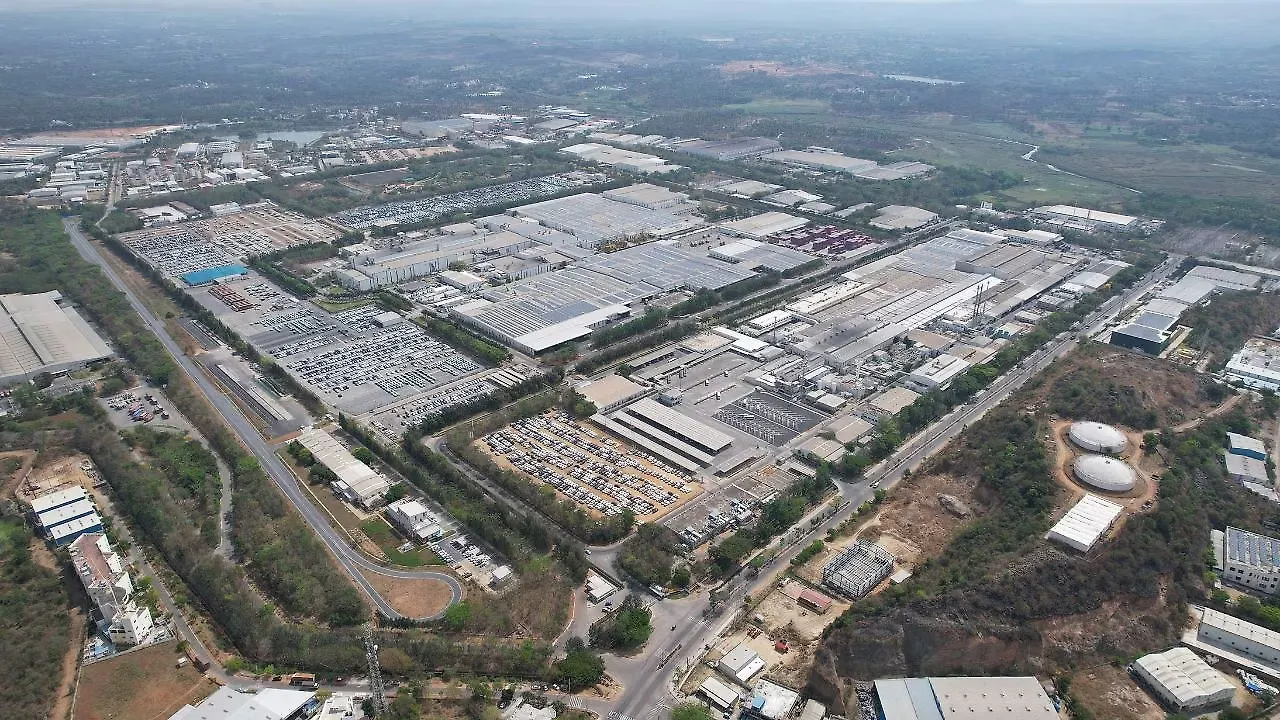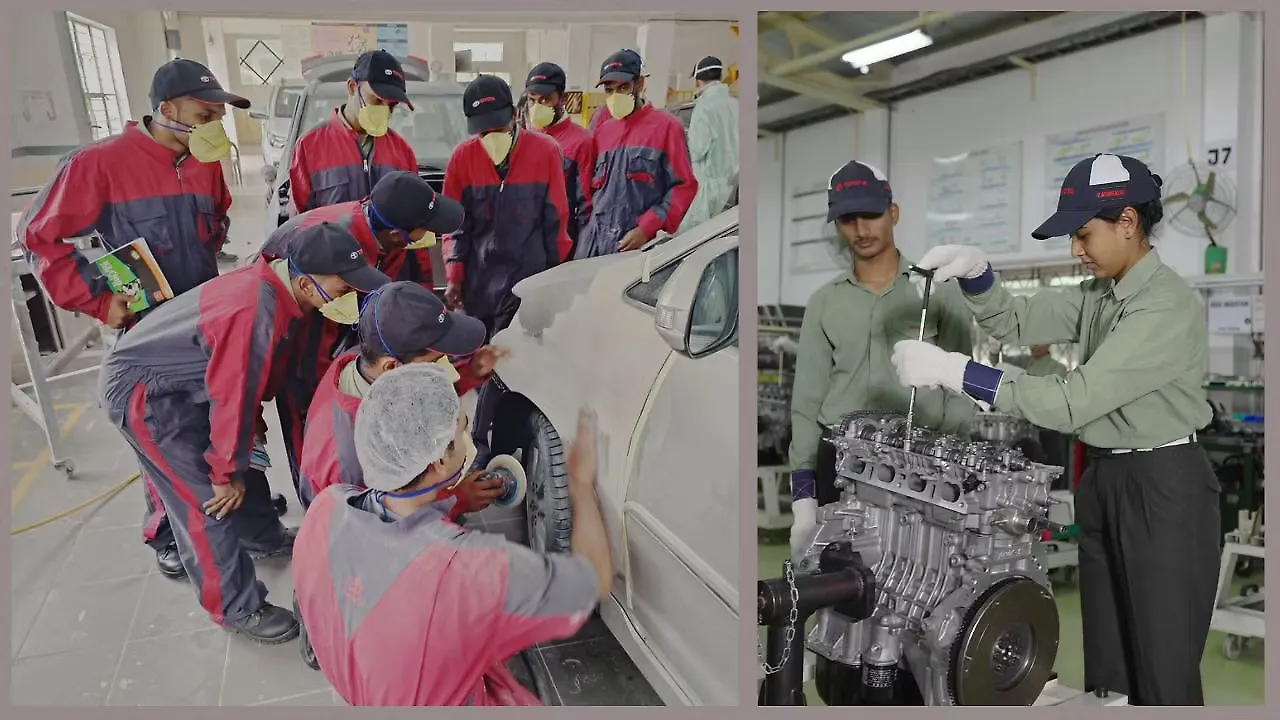
The Toyota Technical Training Institute (TTTI), part of Toyota Kirloskar Motor (TKM), is on a mission to empower women in manufacturing. Soon, it will celebrate the graduation of its inaugural cohort of 235 female technicians, who are poised to make significant contributions to the automotive manufacturing industry.
TKM is establishing its third plant in Bidadi at an investment of INR 3,300 crore, with an annual capacity of 100,000 vehicles. The company aims to leverage women's power in the new assembly line. Currently, Plant-1 operates three shifts while Plant-2 operates two shifts and cumulatively produces 3.42 lakh vehicles per year.
The female technicians graduating from TTTI will be ideal for the third plant, as they are well-versed in the Toyota Production System (TPS) and will be culturally aligned with the manufacturing environment. They bring exceptional involvement, assertiveness, confidence, and team-building skills to the table.
At TTTI, which was established in 2007 with just 64 students on rolls, young women learn vehicle assembly technologies and demonstrate their abilities in quality and productivity, clearly articulating their goals. One of the trainees expressed her clear objective of entering the manufacturing industry: 'I want to join the manufacturing industry to prove that I am equal to or better than my male counterpart. Additionally, I want to show my fellow villagers that anything is possible and inspire them to pursue careers in manufacturing.'
Today, TTTI is a beacon of excellence in technical education in Karnataka, transforming rural youth from the State into world-class technicians. Focusing on skill, knowledge, and personality development, TTTI aims to bridge the gap between traditional education and industry requirements, producing highly skilled professionals ready to meet global standards.

Breaking The Ice
The day at TTTI starts early with a four-kilometre run followed by an assembly where students engage in loud, energetic greetings and physical activities. This practice, designed to overcome the shyness often found in students from rural backgrounds, sets the tone for the day, promoting confidence and teamwork. The assembly includes right and left turns, emphasising discipline and coordination, which are essential qualities for future technicians, as per TPS.
Classes run from 9 am to 4 pm, covering both technical skills and academic knowledge. Later, the students get involved in club activities and manage the gardens, which teaches responsibility and teamwork. The day ends with study time, ensuring a well-rounded educational experience.
Customised Curriculum
TTTI offers two main courses: the Toyota Regular Course and the Toyota Kaushalya Course. The Regular Course, a three-year programme, began in 2007 with trades in automobile, welding, paint assembly, and mechatronics. The intake is 64 students annually, requiring a minimum qualification of 10th standard from Karnataka. The Kaushalya Course, a two-year programme, started in 2021, with an intake of 564 students, split equally between boys and girls aged 18 to 20 with SSLC qualifications.
The curriculum is unique, focusing 70% on-the-job training and 30% on skill development. This hands-on approach ensures that students gain practical experience alongside theoretical knowledge. The training includes a blend of classroom instruction, physical fitness, and personality development activities.
Commitment To Quality, Innovation
TTTI's commitment to quality is evident in its rigorous selection process. The institute received around 4,600 applications for the upcoming academic year, the highest number to date. The selection process includes physical exams, teamwork assessments, interviews, and background checks, ensuring only the most dedicated, economically weaker, and capable students are admitted.
The institute's curriculum stressed holistic development, with 50% of training focused on body and mind, 16% on knowledge, and 34% on skill. The first year focuses on foundational knowledge in English, mathematics, and science. The second year emphasises skill development, and the third year involves on-the-job training.
Training also includes the assembly of various vehicle systems and modules, with a particular focus on powertrains and enhancing dexterity to improve assembly speed. For instance, students dismantle an engine with about 400 parts, reassemble it, install it back into the vehicle, and verify its functionality by cranking it.
Beyond training students, TTTI is focused on imparting TPS and enabling students to conduct value stream mapping to identify flaws and implement corrective actions. The institute confers academic degree to 62 Regular and 41 Toyota Kaushalya (Under the scheme of Directorate General Training (DGT) - Flexi MoU) students from rural Karnataka. Upon completing the course, students receive certifications from Toyota, the Japan-India Institute for Manufacturing (JIIM), and the Automotive Skill Development Corporation (ASDC).
When asked how this training helps TKM address issues related to labour unrest, G Shankara, Executive VP of Finance and Administration at TKM, responded, 'Our challenges are not with wages, welfare, or other similar issues, but with culture.' He explained that undergoing training at TTTI and learning best practices helps employees develop the right mindset.

TKM’s IDEA
Training offered by TTTI is crucial as TKM adheres to the IDEA framework, which stands for Interface reduction, Danger duplication, Ergonomics improvement, and Auxiliary work. TKM also employs Karakuri Kaizen, a concept that optimises machinery with minimal automated resources, significantly reducing electricity usage and CO2 emissions. This concept is used for parts transfer, quality confirmation, and productivity enhancement. Additionally, about 52% of the operations in TKM's plants are manual, primarily on the assembly lines. Therefore, the comprehensive training provided by TTTI ensures that students are ready to integrate seamlessly into the production lines of the vehicle maker. The institute's focus on emerging technologies like electric vehicles and Industry 4.0 ensures that students are equipped with the latest skills needed for the future.
Industry Integration
TTTI's mission is to produce industry-ready professionals who can meet the demands of the modern workforce. The institute has strong ties with TKM and other group companies, ensuring students have ample employment opportunities upon graduation. Over 51% of graduates work with TKM, while others join group companies, supplier partners, and various industries. TTTI's collaboration with more than 60 Government-run ITIs further enhances its training programmes, creating a comprehensive educational ecosystem.
TKM recently expanded TTTI, doubling its intake from 600 to 1200 students, including up to 600 female students by March 2025. During the convocation ceremony in August 2023, academic degrees were awarded to 62 TTTI Regular students from the outgoing batch of 2020-2023, including five female students, as well as to the first batch of 41 Toyota Kaushalya students from the 2021-2023 batch.
TKM aims to train over 500,000 youths by 2030 and expand the TTTI model across India. Several manufacturing companies have visited the institute and have started gradually adopting these best practices. If this initiative gains momentum within the manufacturing industry, it will not only enhance the productivity of the organisations involved but also contribute to societal development, increase share of manufacturing GDP and help the country achieve sustainability goals.
Also Read:
Toyota Introduces A New GX+ Variant In The Innova Crysta Lineup
Varanasi To Host Global Mobility Challenge With Toyota Mobility Foundation